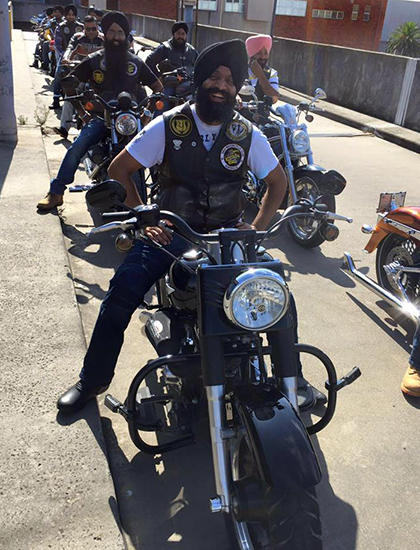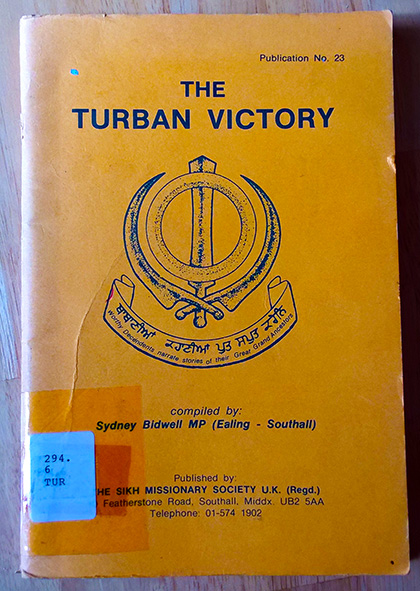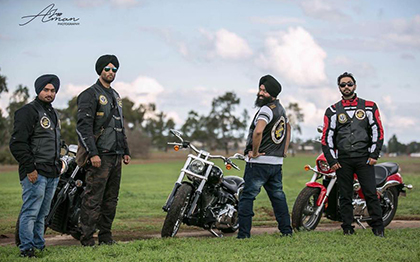 Australia – A group of motorcyclists in the Australian state of New South Wales are seeking an exemption from the mandatory wearing of motorcycle crash helmets.
Australia – A group of motorcyclists in the Australian state of New South Wales are seeking an exemption from the mandatory wearing of motorcycle crash helmets.
The group who are Sikh motorcyclists are asking for the exemption in the helmet wearing law that states:
- The rider of a motorcycle must wear an approved motorcycle helmet securely fitted and fastened on the rider’s head.
- The rider of a motorcycle must not ride with a passenger unless the passenger is wearing an approved motorcycle helmet.
From various reports – ABC News – Daily Mail – Motorbike Writer – and from the Sikh Motorcycle Club Australia the exemption that is being asked for would apply to travelling under ’50 or 60 kilometres an hour.
We contacted the Sikh Motorcycle Club Australia and Jagmeet Singh Mangat from the club responded:
“Almost all turban wearing Sikhs face the same issue in Australia. We are not asking for full exemption but only at low speeds for e.g. under 60km/ph. There are safety concerns among the Sikh community as well and there will be few turban wearing Sikhs who may still choose to wear a helmet whilst riding their motorcycle even if they get the exemption. So our aim is to attain that freedom of choice where a turban wearing Sikh can choose whether to wear a helmet or not.
We love riding motorcycles and have been riding them safely back in India for decades wearing turbans but the riding speeds vary between 40-60km/ph there hence we are not asking for exemption for highway/freeway speeds.
But in Australia due to strict law about helmets, our turban wearing members forced to wear helmets which we feel is discriminatory as they have to remove their turbans to wear helmets.
Australian Law Reform Commission states under Freedom of religion 4.38: “Freedom of Religion is infringed when a law prevents individuals from practising their religion or requires them to engage in conduct which is prohibited by their religion.” Sikhs with uncut hair are prohibited to remove their turban in public or when they are on the move.
The current law requires them to remove their turban to wear a helmet, hence the issue has been raised.
We have had lots of local Sikhs contacting us to raise our voice against this discriminatory law.
Traditionally and historically all Sikhs wear turbans but the helmet law in Australia takes our freedom of religion away from us.
Similar laws were changed in parts of Canada and UK and we do seek the exemption here in Australia as well although we haven’t challenged the law yet.”
The exemption would allow Sikhs wearing the Turban to attend Sikh functions, marriage functions, ride inner streets and roads around their farms, slow riding charity fund raising events that require riding on public roads.
The UK Exemption
As mentioned by Jagmeet Singh Mangat, similar exemptions are in place in the UK and parts of Canada. We think we need to look back at history as regards helmet exemptions for Sikhs in countries outside of Australia, which starts for us with the Sikh exemption in 1976 in the United Kingdom.
Both of us at Motorcycle Minds come a background of riders’ rights from a riders’ organisation – Motorcycle Action Group (MAG) – that was formed and campaigned in the UK against the introduction of the mandatory wearing of helmets, which was passed into UK legislation in 1973.
Although the MAG campaign against the helmet law does not appear to have featured in any detail, the issue of exemption for Sikhs (recorded history is what we are relying on) the Sikh community in the UK were campaigning for an exemption.
The exemption for Sikhs is simply stated in the UKs Highway Code
- Rule 83 – On all journeys, the rider and pillion passenger on a motorcycle, scooter or moped MUST wear a protective helmet. This does not apply to a follower of the Sikh religion while wearing a turban. Helmets MUST comply with the Regulations and they MUST be fastened securely. Riders and passengers of motor tricycles and quadricycles, also called quadbikes, should also wear a protective helmet. Before each journey check that your helmet visor is clean and in good condition.
Although a simple line in the Highway Code the arrival to this exemption went through the full procedures in the Houses of Commons – Introduced as a 10 Minute Rule Bill – Private Members’ Bill – The Lords – Parliamentary Committee – Royal Assent.
This route to the amendment in the Road Traffic Act for the Sikh exemption the parliamentary procedure was introduced by Labour MP Sydney James Bidwell (Ealing – Southall) – (14 January 1917 – 25 May 1997) a backbencher in the then Labour Government which saw the Motor-Cycle Crash Helmets (Religious Exemption) Act passed by the UK Parliament.
The Turban Victory
 Thankfully you can read the full parliamentary procedures in the online book – The Turban Victory – with forewords – acknowledgements – messages of support – Hansard text of the debates etc. We were able to track down a paper copy via Amazon, so reading a paper copy gave us a better feel of the issue.
Thankfully you can read the full parliamentary procedures in the online book – The Turban Victory – with forewords – acknowledgements – messages of support – Hansard text of the debates etc. We were able to track down a paper copy via Amazon, so reading a paper copy gave us a better feel of the issue.
That lets us look at the negative and positive sentiments at that time, similar comments to these are appearing in present day Social Media that were answered back then, as the exemption took around three years to achieve.
So, we can use the book to answer today’s questions and hopefully if your opinion is one that is opposed to a Sikh religious exemption, on whatever grounds or road safety concerns it will help you at the very to understand any Sikh exemptions. N.B.: All the following quotes are taken from the on line book which does not have page number, however the quotes are sequential.
- The Turban Victory – “He (Minister For Transport) seemed to think that the Sikh’s exemption would lead others to clamour for exemption”
Motorcycle Minds – 40 years later and we wait for clamour from these others.
- The Turban Victory – “What steps does he expect will be taken to make sure that those that are exempt are genuine followers of the Sikh religion and not people who are merely using it as an excuse not to wear a crash helmet”
The Turban Victory – “The onus of proof should be on the motor cyclist. Instead of suggesting the paraphernalia of carrying identity cards and so on, we thought it would not be beyond the wit of the police to determine a person’s bona fides.”
- The Turban Victory – “The vast majority of people who criticise this move-apart from people who do it purely on racialist grounds-do so from a fundamental misunderstanding. They do not appreciate the religious angle. They think that some special dispensation is being given to immigrant communities and that the religious consideration is overriding.”
- The Turban Victory –“My hon. Friend the Minister for Transport has said on many occasions that he fully recognises the religious claims of the Sikhs, but against them he has to balance the principle that a law which is amply justified on road safety grounds should apply equally to everyone.”
The Turban Victory – “The Bill, therefore, is not based on road safety criteria. The need for road safety provisions is of tremendous importance. The Bill is based on religious tolerance and that, too, is an important and vital part of our society, in war as well as in peace. There is no possibility of a compromise decision on this difficult choice. There will be people who will oppose it, some on the grounds of road safety, some because of religious intolerance and some on grounds of equality. I repeat that if Parliament concludes that in this case religious tolerance outweighs road safety and equality, the Government will accept that decision.”
- The Turban Victory – “As has been suggested, there are motor-cyclists who feel very strongly that no section of the motor-cycling community should be exempt. These are the people who objected in the first instance to the wearing of crash helmets. But their objections, 1 think, are purely on the grounds of equality of treatment, and they are not preoccupied with ethnic arguments. But we should place on record that we acknowledge the fact that a section of the motor-cycling community feels put out by this legislation.”
The Turban Victory – “I happen to believe that it is important to get the message across today that this is basically a matter of religious toleration and is in no way based on racial or other grounds.”
- The Turban Victory – “There are strong road safety arguments for the wearing of crash-helmets by all motor-cyclists irrespective of religion.” –
The Turban Victory -“When one looks at road safety regulations one must come to the conclusion that we make a lot of compromises. I will sum up by saying that we have never in this country, said that road safety should be the be all and end all of everything that we do in legislation. On certain occasions we have put it in a back seat. I think the justification for doing it on this occasion is well made out.”
- The Turban Victory – “Part of the heading had been substituted with the words : ”Let us live, work and ride with turbans.” That is the crux of the matter. We have in this country laws which are laid down for the protection of the community at large, mostly based on the assumption that we are all the same.”
The Turban Victory – “There are, as we know, exceptions to some rules. The law advocating the wearing of crash-helmets while driving a motorcycle may very well be an exception in the case of the Sikh community.”
- The Turban Victory – “I believe that peaceful demonstrations, on this or any other topic, are entirely justified, provided that third parties are not thereby harmed or inconvenienced. In “peaceful demonstration” I would include seeking the martyrdom of courting arrest. Indeed, if I were myself a Sikh, I might well have acted in the same way, whether or not I was a practising Sikh, if I wanted to ride a motor-cycle. However, I am not a Sikh but I come from what is still, for the time being at any rate, the majority community in this country; and so I believe it is incumbent upon me to scrutinise legislation of this kind carefully to see that the rest of us are not inadvertently put at a disadvantage by what may superficially appear to be innocuous and, indeed, welcome legislation in so far as it is of liberalising nature.
- The Turban Victory – “The ‘Motorcycle Rider’ took a poll among members of the British Motorcycle Federation-quite a large sample of just under 900 people-and of those who gave a positive reply 69 per cent were opposed to granting Sikhs an exemption which was not available to the public at large.”
The Turban Victory – “However, if you invite people to say what is their opinion of a particular change it is human nature that nearly always you get the people who are strongly opposed to something writing in and expressing an opinion. If those were the figures which arose from the request by this magazine for the opinions of its readers, I am not at all surprised but I think that I should tell your Lordships that after the Second Reading of the Bill, when the debates in our House were presumably reported in the motor-cycling Press, I had a total of two letters. One was couched in neutral terms but commented on what the person had read in the motor-cycling journal. The other letter was from a person who is mildly against the exemption of Sikhs. I would not put it any more strongly than that.”
Motorcycle Minds – The days before social media……when thought was needed to sit down and put pen to paper.
- The Turban Victory -“He spoke about the cost of a cracked skull being £400 to £500. Of course the £10 which I suggested was purely as an insurance premium. I am sure he does not believe that every time anybody gets on a motor-cycle they are going to fall off on to their heads.”
The Turban Victory – “If persons are to be exempted through the payment of money, which is a bad principle in itself, it should be more like £400 or £500. Having said that, I will sit down, but I cannot support these Amendments. I do not want to be rude, but I would say that they are rather nonsense”.
Motorcycle Minds – As far as we are aware in the UK there has been no burden on any aspect of the National Health Service – emergency services etc – or even insurance premiums in the forty years the UK exemption has been in place.
In a foreword to the book the Rev. Michael Hollings said, “Here is recorded the process by which his bill to exempt turbaned Sikhs from wearing motor-cycle crash helmets went stage by stage through the British Parliament.
We live at a time when there is much anxiety about the situation of different ethnic groups in the British Isles. It will be good for the study of race or community relations to be able to see how this bill went through both Houses, the Commons and the Lords, finally to emerge as part of the Law of this land.
It is not easy for people of different backgrounds and persuasions to understand what exactly is important for people who have another culture and another religion from their own. This calls for listening, patience, understanding and openness. Such is the essence of community work which strives to work within a society pledged to freedom, justice and peace.
The right to wear the turban is very dear to members of the Sikh nation. It has been challenged in other areas of our society, and the success of this bill will hearten Sikhs throughout the world.
The victory of the bill’s passage through Parliament is a victory for toleration, and especially for religious toleration among all peoples.”
A message we think that as relevant today as it was over 40 years ago.
It is hard to relate safety to personal freedoms, for whatever reason and a debate with the “safety lobby” is always a fraught one, our opinion is that road safety has to stand aside amongst the reasoning of personal freedom and liberty.
As Sydney James Bidwell emphasised that seeking the exemption the bill was to enable turbanned Sikhs to ride motor cycles, to ride to work or ride a motorcycle as part of their employment. As times change we would add to enable to take part in social and leisure activities when using a motorcycle on the highway.
Exemptions in Other Countries
Certain jurisdictions in Canada have a helmet wearing exemption for Sikhs – British Columbia, Manitoba – Alberta (1) – with an ongoing challenge in Ontario. Also Hong Kong allows an exemption(2).
The exemption is worded differently in the British Columbia Motorcycle Safety Helmet Exemption Regulation going beyond the simplicity of the UK wording:
- A person who practices the Sikh religion or is a member of the Sikh religion, has unshorn hair and habitually wears a turban composed of 5 or more square meters of cloth.
In the United States we asked Megan Ekstrom from the Motorcycle Riders Foundation (MRF) that assuming in the U.S. where there are helmet wearing exemptions that this applies to all, with certain caveats on age/insurance? But in states where it is mandatory to wear a helmet we would also assume that this is for all, with no exemptions – medical – or religious – as per the Sikhs?
Megan replied, “I did some quick research and the only thing I can find of consequence is that here in the U.S. a legal challenge was posed in 1993 which disputed California’s mandatory helmet law based on religious reasons (in this case, a practicing Sikh). The California court sided in favour of the state suggesting that the mandatory helmet law was “not rendered unconstitutional just because it incidentally impacts a person’s religious practices.”
More recently in Northern Ireland, as part of devolved government in the UK a new regulation was introduced only in Northern Ireland that extended the wearing of helmets to those who ride motor quadricycles, the exemption for Sikhs was retained.
Part of this regulation proposed that all riders of motor trikes and their passengers in Northern Ireland would also be mandated to wear a helmet.
Although this proposed part of the regulation was not included in the final amendments to the regulation it had retained the exemption not to wear a helmet to any follower of the Sikh religion while they are wearing a turban. Incidentally the government Department concerned is to keep the proposal to the regulation to provide an exemption on medical grounds under review.
As for India it would appear that when a mandatory helmet law was introduced Sikhs where exempted from wearing a helmet.
Australia – Failed Previous Exemption
 Although the Sikh community are exempt from wearing helmets when riding a bicycle in Queensland, South Australia and Victoria, this is not the first time that a motorcycle helmet exemption for Sikhs has been put forward.
Although the Sikh community are exempt from wearing helmets when riding a bicycle in Queensland, South Australia and Victoria, this is not the first time that a motorcycle helmet exemption for Sikhs has been put forward.
In 2013 in the state of Tasmania Sikh Harpreed Singh put forward a legal challenge for an exemption, this was not successful.
Unfortunately, just because we ride motorcycles it does not mean we always agree.
The Australian rider organisation M.R.A. Motorcycle Riders’ Association Of SA INC in an article by Harald Lindemann in its Centrestand newsletter in 2013 stated, “The issue of road safety is simple. Either the law is good for all citizens or it is a bad law. With regards to helmet laws the balance of opinion and evidence says that it is a good law.” also stating, “If our religious law is in opposition to the civil law then a compromise is demanded as we are not entitled to force others not of our own religion to live by those rules. Neither of these situations is the case here“, further stating, “the right to ride a motorcycle comes with conditions attached. The law makes it clear under which conditions we will be allowed to ride a motorcycle. In this case it is clear that the religious restrictions make it impossible to both ride and obey the law. That is something that has to be lived with. You can’t have it both ways.
The present Chairman of the Australian Motorcycle Council Shaun Lennard has previously been quoted in 2013 that while he, “empathises with Sikhs, he does not support their call.”
We would assume that these positions would not have changed from 2013.
Rounding Up
We have tried to be as accurate as possible in this article which includes some anecdotal statements but our overall conclusion – the way we were brought up – is that motorcycle riding Sikhs should be exempt from wearing a motorcycle helmet at least at slower speeds.
Feel free to discuss this but take into consideration that these Sikhs are practicing their faith and have been put in a quandary – to follow their religion and not ride a motorcycle or ride a motorcycle and be a less devoted Sikh. A difficult choice and we would guess that in the statistics – the number of Sikhs injured or killed in Australia on a motorcycle would be less than of being struck by lightning.
In other words, the legislators and other non-Sikh motorcyclists should take in consideration a more tolerant view regarding this request by the Sikh community.
Sometimes at Motorcycle Minds we can be somewhat eloquent and flowing but we will leave this with thoughts from Helmets.org – although it is about push bikes, the sentiments are the same:
“Turbans may vary according to regional styles, and can differ considerably in size, shape, density and other characteristics, so it would be difficult to design a helmet to fit over or under them. A turban-shaped helmet is probably not a viable option even if it were acceptable to Sikhs, because the traditional Sikh turban is meticulously wound, and it would be difficult for a turban wearer to remove their turban, ride in the helmet, and rewind the turban after the ride. Winding a turban over a helmet would eliminate ventilation and result in a very large headgear, while still requiring that the normal turban be taken off to ride.
Our conclusion has been that lawmakers should either grant Sikhs a formal exemption, as some have, or expect that a law-abiding Sikh covered by the law will not be able to ride legally unless they compromise their religious precepts and remove the turban to put on a helmet. Law enforcement for most helmet laws is sporadic at best, and if the law does not provide an exemption for turban-wearers it is likely that law enforcement officers will simply let them ride on without interference. That is not the same thing as a legal exemption, but it preserves the Sikhs’ ability to use bicycles at their own risk of head injury.”
Our own final thought which should cause no surprise is that we support and wish the Sikhs in New South Wales all the success in achieving an exemption from wearing a helmet.
Information
Sikh Motorcycle Club Australia – On Facebook
(1) The Alberta Traffic Safety Act and Off-Highway Vehicle (OHV) Regulation was enacted in May, 2017 and states that compliant helmets must be worn by Off Highway Vehicle users when riding on public land. Public land means Crown land, including areas that have been designated for public OHV use, public roadway and highway rights-of-way. In the definition of vehicles this includes motorcycles, when specifically designed for such travel. An exemption was included that the wearing of a helmet would not be required, “Helmet use is not required by individuals who are a bona fide member of the Sikh religion wearing turbans. This means that someone self-identifying as a member of the Sikh religion and wearing a long length of cloth wound around his or her head into a headdress is exempt.” – “Examples of not complying with an exemption are: Saying you are Sikh but not wearing a turban”. Other types of exemptions have been considered if there is a medical or physical condition that prevents helmet use.
(2) Hong Kong as far as we can ascertain that if a Sikh wants an exemption from wearing a helmet they have to apply to the Transport Department for exemption. Once approved, they can ride a motorcycle without a helmet and are issued with an “identity” type card.
Sikhs from Canada Riding Alaska – We would Love an Adventure with these guys


Helmets should be optional, how would you like to be 80+ yrs, sitting in a sidecar in qld summer, sweat running down your face, because you have to wear a helmet with little air flow behind a windscreen? A seat belt would be the alternative in this situation.
Hopefully Sikhs can get helmet exemption soon in Australia.